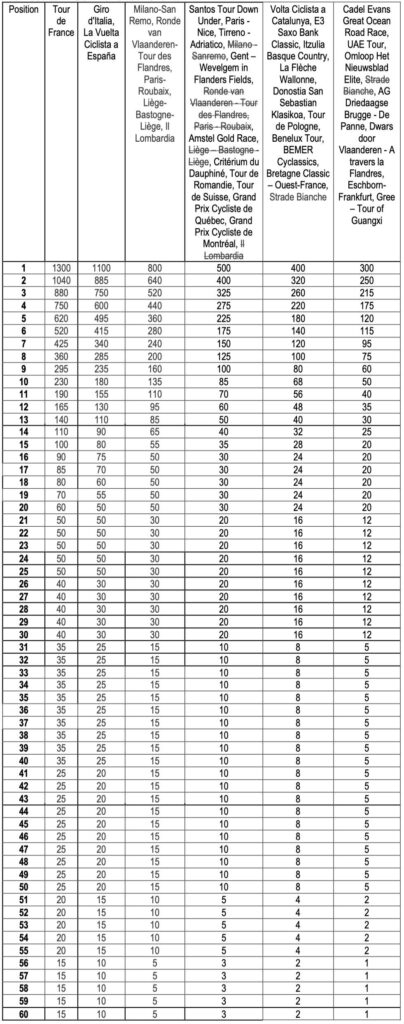How Much Are UCI Points Really Worth in Cycling, and Why Do They Matter?
In the world of competitive cycling, UCI points serve as both a currency and a lifeline, determining not only the status of individual riders but also the prominence of entire teams. As cyclists navigate the grueling challenges of races across the globe, the accumulation of these points can dictate entry into prestigious events, grant eligibility for sponsorships, and influence the trajectory of careers. But how much are these points truly worth, and what factors contribute to their valuation in an ever-evolving sport? This article delves into the complexities of the UCI points system, examining its implications for athletes and teams alike and uncovering why these seemingly abstract numbers hold significant weight in the cycling community.
Understanding UCI Points: The Key to Success in Competitive Cycling
In competitive cycling, UCI points serve as a crucial measure of an athlete’s performance and status within the sport. Accumulating these points is essential for two primary reasons: qualification for prestigious events and team selection. Riders earn UCI points by competing in events sanctioned by the Union Cycliste Internationale, with the points awarded based on the race’s importance and the rider’s finishing position. This creates a competitive landscape where not only the determination but also strategic decision-making regarding which races to enter becomes vital for a cyclist’s career trajectory.
The impact of UCI points extends beyond personal achievements. For teams and sponsors, a cyclist’s points ranking can determine funding and resources allocated to them, creating a direct link between an athlete’s success and their financial backing. High-ranking riders often attract more lucrative sponsorship deals and media attention. Moreover, a detailed look at how UCI points are distributed reveals the disparities across different levels of competition. In fact, according to recent data:
| Race Level | UCI Points Awarded for 1st Place |
|---|---|
| World Tour | 200 |
| Continental | 100 |
| National Championships | 50 |
This table illustrates the significant differences in point rewards, highlighting why it is critical for cyclists to target higher-tier events to swiftly accumulate points. Subsequently, understanding this system enables athletes to formulate effective competition strategies, ensuring they stay competitive in the evolving landscape of professional cycling.
The Impact of UCI Points on Race Opportunities and Sponsorships
The UCI points system serves as a pivotal mechanism in professional cycling, significantly influencing not only a rider’s eligibility for prestigious races but also their overall career longevity. Accumulating UCI points enables cyclists to enter events on the UCI calendar, which are often crucial for gaining exposure and enhancing competitive capabilities. As a result, riders with higher point totals often secure participation in sought-after races like the Tour de France and World Championships. In contrast, those struggling to amass points risk being sidelined from critical opportunities, resulting in a stark discrepancy in race access and potential earnings among peers.
Moreover, the correlation between UCI points and sponsorship deals cannot be overstated. Brands are inclined to invest in athletes who demonstrate consistent success on their race schedules, reflected directly through their UCI points. Sponsorship opportunities can dramatically increase for riders who perform well and earn points, leading to financial backing that supports training, equipment, and travel expenses. This leads to a cycle where high-performing athletes not only attract more sponsorship dollars but also enhance their visibility and marketability, creating an ecosystem where UCI points influence not just immediate race outcomes but the broader financial landscape of a cyclist’s career.
Navigating the UCI Points System: Strategies for Aspiring Cyclists
For aspiring cyclists looking to make their mark in competitive cycling, understanding the UCI points system is crucial. These points, awarded based on performance in sanctioned events, determine a cyclist’s ranking and eligibility for prestigious races. Points can be accrued through various competitions, ranging from local circuit races to international championships. Successful navigation of this system involves strategic planning of race schedules, focusing on events that offer higher point values. To maximize your UCI point accumulation, consider the following:
- Target High-Value Races: Prioritize competitions that offer a greater number of points, particularly at higher tiers.
- Consistency Over Quantity: Aim for consistent performances in fewer races instead of spreading resources too thin across many.
- Build Strong Relationships: Network with other cyclists and teams to gain insights about upcoming events and strategic insights.
Moreover, understanding the intricacies of the points system can guide your choice of race categories, helping to focus efforts where they will yield the most rewards. To illustrate the point allocation, refer to the following example:
| Race Level | Points Awarded |
|---|---|
| World Championships | 1,000 |
| World Cup Events | 500 |
| Continental Championships | 200 |
| National Championships | 100 |
By focusing on high-value events and planning your racing calendar with precision, cyclists can effectively boost their UCI points. This system not only impacts eligibility for future races but also elevates the athlete’s profile within the cycling community.
Closing Remarks
In conclusion, UCI points serve as much more than mere numbers in the world of competitive cycling; they are a vital currency that shapes career trajectories and influences race strategies. As we have explored, the implications of these points extend beyond individual accolades, affecting team selections, sponsorship deals, and even national rankings. With the ongoing evolution of the sport and its governing structures, understanding the value of UCI points is crucial for riders and fans alike. As cycling continues to gain momentum on the global stage, the significance of these points will only deepen, making it essential for all stakeholders to stay informed and adapt to this dynamic landscape. Whether you’re a seasoned pro or an avid enthusiast, recognizing the role of UCI points in cycling’s intricate ecosystem offers insight into the very fabric of the sport we cherish.











